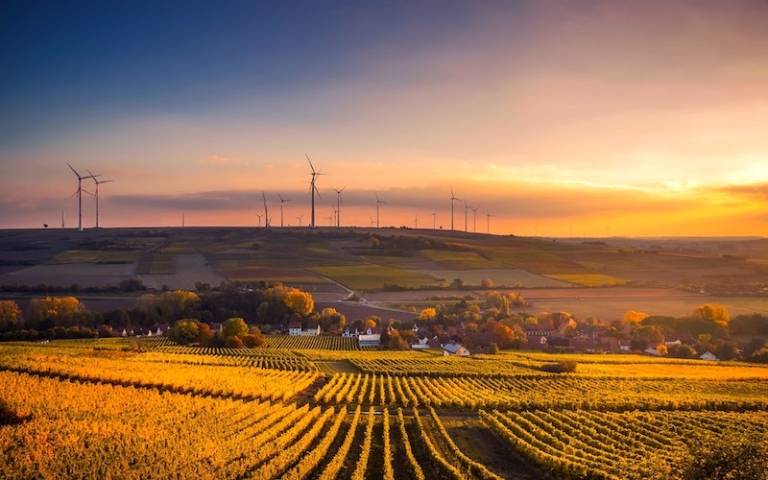Blog: 'ISR in conversation with…Erling Holden and Kristin Linnerud on sustainable development gaps'
29 June 2023
Reflections on our recent ‘ISR in Conversation…’ event with Erling Holden and Kristin Linnerud, at the UCL Institute for Sustainable Resources

A blog by Kathy Page
On 21st June, Professor Erling Holden and Professor Kristin Linnerud, of the Norwegian University of Life Sciences joined us for the final talk in this term’s ‘ISR in conversation with…’ series.
Sustainable development has become so large and complex it, ‘(H)as become everything, and therefore nothing’. This thought-provoking statement kicked off the first part of our talk, with Professor Erling Holden helping us understand the ‘somethings’ that could counteract the ‘nothing’, starting with introducing us to the roots of sustainable thinking. This was a narrative journey from Pliny the Elder’s Naturalis Historia in the 1st Century, through to our more modern interpretation with the World Conservation Strategy of 1980 being the first time the phrase ‘sustainable development’ was used consciously, with definition. As Professor Holden noted: ‘Some sort of sustainable thinking has always been a part of the human mindset’.
Professor Holden presented the researcher’s theoretical five-step model of sustainable development:
- An ethical statement and three moral imperatives (ensuring social justice, satisfying human needs, respecting environmental limits)
- The ‘somethings’ must come from theory
- Deriving key themes (key ‘somethings’) from those theories
- Suggesting headline indicators for each key theme
- Assigning thresholds to those indicators
Erling then reminded us that all the key sustainability themes are equally important, and that the thresholds set are the minimum we should be aiming for.
This theory forms the basis for their model, which was explained by Professor Linnerud. Data was inputted from 117 countries (for the years 2010 – 2015) to assess the capabilities of individual countries and ‘clusters’ of countries, looking at not only environmental indicators (as in the popular planetary boundaries work) but indicators on poverty, democratic participation, income inequality and human capability (which combines education, life expectancy and income). As per the model, each indicator also needs a threshold, and these were drawn from expert international bodies, such as The World Bank and the UN.
It was found that countries could be clustered by those facing similar challenges. Kristin introduced us to ‘rich, democratic, egalitarian polluters’ which fare well in human needs but have a problem with the environmental indicators; ‘emerging economies struggling with social justice’ which are struggling with democratic participation, but better at balancing across human and environmental needs; and a cluster defined by ‘poverty and undemocratic institutions’ which are low-income countries who currently have a low impact on the environment.
The sustainable development ‘gap’ as defined denotes the distance between the indicator values and their corresponding thresholds. Some countries, it was noted, have been better at reconciling these goals and have managed to reduce their ‘gap’ over time. It will be interesting to see the next iteration of this work as the researchers update the model this year with more recent data.
We then heard from our respondent Julia Tomei, Deputy Director of the UCL Institute for Sustainable Resources and Associate Professor in Energy, Resources and Development, who highlighted some ongoing projects within the institute which are relevant to this topic. This included the research of Julia and Alison Fairbrass on developing a natural capital indicator framework that will provide local decision-makers with a reporting system of environment, economic and social indicators for the Pantanal region in Brazil.
The event continued with a lively conversation between speakers, our respondent and the audience. The questions asked by the audience included one about the potential for countries to improve their sustainable development gaps – the visiting professors said they had seen that the environmental pressure is staying while clusters improve the human element, and that for poorer countries as they develop an environmental gap is likely to appear.
There was encouragement from audience members for the researchers to investigate measuring the progress of individual countries, and whether there was evidence of the effects of countries actions (such as policies around environmental protection) on the indicators.
The discussion closed on a reflection that the language of sustainable development has moved away from ‘pain’ whereas in the past, ‘(W)e were aware that this was going to be painful, especially for those in rich countries’. It was underlined that action is clearly needed on the Sustainable Development Goals from all countries.
This was the last in our current series of ‘In Conversation with…’ events, but we are currently planning our events series for next term.
Links
- Read the blog about our 'In conversation with…Arjan Geveke on energy intensive industry's future' event
- Read the blog about our 'In conversation with…David Bent on business, policy and transformation' event
- Read the blog about our 'In conversation with…Alex Gilbert on the future of London' event
- Read more about Kristin and Erling’s research on the sustainable development gap
Image credit: pexels.com
 Close
Close

